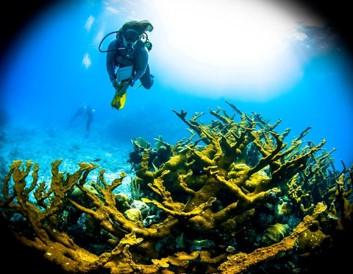Disturbance Ecology of Coral Reefs
Global climate change, particularly the increase in ocean temperatures, continues to be a significant threat to coral reef ecosystems. One consequence of ocean warming is the increase in intensity and/or frequency of tropical storms; this is because warmer water supplies more heat to the atmosphere, resulting in higher energy storms. Storms cause substantial physical damage to coral reefs; however, it is unclear how storms affect coral reef structure and function in the long-term. Most studies have focused on small geographic areas and relied only on the most basic metric of coral recovery (the percentage of the seafloor occupied by living corals), which provides little information about changes to species composition or ecological function post-disturbance.
The goal of my dissertation research is measure the effects of tropical storms on coral diversity and function and to determine how this response is affected by increasing ocean temperatures. I am currently working on a global meta-analysis of tropical storm impacts on coral reefs. My goal is to quantify reef resitance to and recovery from disturbances, both in terms of changing percent cover & coral community structure.
Elkhorn Coral Recovery in Mexico
 Populations of elkhorn coral (Acropora palmata) in the Caribbean were drastically reduced by an outbreak of white-band disease in the 1980s and are now listed as endangered. Recovery has been isolated and patchy and little is known about factors contributing to its regrowth. In 2016, I investigated the role herbivory (grazing of macroalgae by black sea urchins, Diadema antillarum and parrotfishes) might be playing in elkhorn recovery in Akumal, Mexico. I quantified the presence and density of elkhorn coral, urchins, and parrotfishes, and tested the impacts of grazing on coral growth. My results suggest that the presence and amount of live elkhorn tissue is correlated locally high densities of Diadema urchins and parrotfishes. Additionally, urchins were strongly correlated to a lower percentage of macroalgae– a key competitor of coral species.(Photo credit: Baruch Figueroa-Zavala)
Populations of elkhorn coral (Acropora palmata) in the Caribbean were drastically reduced by an outbreak of white-band disease in the 1980s and are now listed as endangered. Recovery has been isolated and patchy and little is known about factors contributing to its regrowth. In 2016, I investigated the role herbivory (grazing of macroalgae by black sea urchins, Diadema antillarum and parrotfishes) might be playing in elkhorn recovery in Akumal, Mexico. I quantified the presence and density of elkhorn coral, urchins, and parrotfishes, and tested the impacts of grazing on coral growth. My results suggest that the presence and amount of live elkhorn tissue is correlated locally high densities of Diadema urchins and parrotfishes. Additionally, urchins were strongly correlated to a lower percentage of macroalgae– a key competitor of coral species.(Photo credit: Baruch Figueroa-Zavala)
Here’s a video of us conducting elkhorn surveys in Mexico!
Our study is available (open access!) at Frontiers in Marine Science.
Perceptions of Resource Management
I served as a Peace Corps volunteer in the Philippines from 2012-2014 and during that time also completed my masters thesis! I conducted an evaluation of coastal resource management programs (CRM) in Baybay, Leyte using community perceptions of coastal resource condition, management practices, and CRM program outcomes. To gather perceptions, my coworkers and I surveyed almost 300 coastal residents in 9 coastal villages. Results were used by managers to target key concerns of respondents and adapt management practices for a more equitable, efficient and sustainable program. My work was recently published in Ocean & Coastal Management. Please contact me if you would like a full text copy of the article!